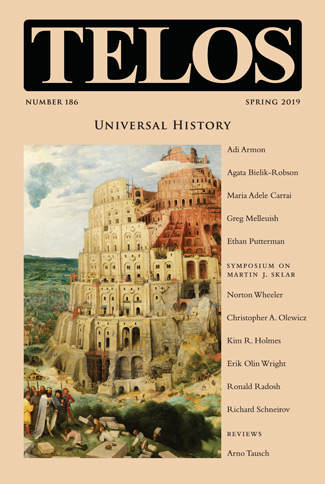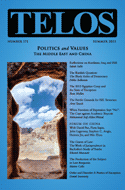Is Putin the madman they say? Or is he, to the contrary, somebody who coldly calculates his rational self-interest, in the manner of Thomas Hobbes’s legendary sovereign power or Niccolò Machiavelli’s eponymous prince?
In short, is it surrealism, rooted in deranged psychological fantasy, or Realism, grounded in hardcore political science, that we are up against?
Or could there be an alternative way of looking at it, one less familiar, more specific, grown-up, and intellectually challenging, if also less emotionally reassuring?
Let’s try putting in jeopardy our own “moral clarity” for a change. After all, while every war must perforce seem “needless” to beautiful souls, just as any person in charge of a modern state could be tagged a “killer” by children, nevertheless, military conflict, experience teaches, will not always be so readily averted.
If only for the sake of a diverting thought experiment, let’s examine in a bit more detail some possibilities—in hopes of dispelling a portion of the gloom that engulfs us in these dark times.
Continue reading →
By Russell A. Berman · Thursday, August 12, 2021 Renaud Girard is an American-born French journalist, the author of several books on world affairs, especially the Middle East. In this trenchant commentary on the Afghan debacle, he recognizes the defeat for what it is, bluntly invoking the collapse of the imperial German army at the end of the First World War. Is that an overstatement or an unflinching naming of the collapse of an order? Girard brings a realist eye to the factors that have contributed to the current situation, asking us to understand them and their consequences, as the Taliban proceed from city to city, heading toward Kabul.
Continue reading →
By Erik Olin Wright · Thursday, May 9, 2019 Erik Olin Wright’s “Martin Sklar’s Theory of Capitalism and Socialism” appears in Telos 186 (Spring 2019). Read the full article at the Telos Online website, or purchase a print copy of the issue in our online store. Individual subscriptions to Telos are available in both print and online formats.
 This essay explores how Martin Sklar’s typology of the patterns of thought that have animated social and political struggles in capitalist societies since the mid-nineteenth century can, with some modification, be incorporated into a more general analytical framework for thinking about alternatives to capitalism. Sklar frames his analysis primarily in terms of two contrasts—between what he calls “utopian” and “realist” modes of thoughts, and between capitalism and socialism as ways of organizing political-economy institutions. He supports a realist mode of thought that examines the ways in which socialist elements emerge within capitalism, creating various kinds of hybrids through what he calls the “capitalism/socialism interplay.” The prospects for progressive social change come out of that interplay. This essay proposes modifying Sklar’s framework in two respects: First, rather than rejecting the utopian mode of thought, utopian models can be useful as a way of clarifying the normative foundations of struggles for human emancipation and the logical connections between different elements of proposed alternatives to existing institutions and social structures. Second, while Sklar is correct that real economic systems contain hybrids of capitalist and noncapitalist elements, it is a mistake to lump all relevant noncapitalist elements under the rubric “socialist.” Specifically, it is useful to distinguish statism from socialism. This creates a more nuanced conceptual map of possibilities and points more clearly to the problem of democratizing state and democratizing the economy as the central task of progressive politics. This essay explores how Martin Sklar’s typology of the patterns of thought that have animated social and political struggles in capitalist societies since the mid-nineteenth century can, with some modification, be incorporated into a more general analytical framework for thinking about alternatives to capitalism. Sklar frames his analysis primarily in terms of two contrasts—between what he calls “utopian” and “realist” modes of thoughts, and between capitalism and socialism as ways of organizing political-economy institutions. He supports a realist mode of thought that examines the ways in which socialist elements emerge within capitalism, creating various kinds of hybrids through what he calls the “capitalism/socialism interplay.” The prospects for progressive social change come out of that interplay. This essay proposes modifying Sklar’s framework in two respects: First, rather than rejecting the utopian mode of thought, utopian models can be useful as a way of clarifying the normative foundations of struggles for human emancipation and the logical connections between different elements of proposed alternatives to existing institutions and social structures. Second, while Sklar is correct that real economic systems contain hybrids of capitalist and noncapitalist elements, it is a mistake to lump all relevant noncapitalist elements under the rubric “socialist.” Specifically, it is useful to distinguish statism from socialism. This creates a more nuanced conceptual map of possibilities and points more clearly to the problem of democratizing state and democratizing the economy as the central task of progressive politics.
Continue reading →
By Russell A. Berman · Monday, June 15, 2015 Telos 171 (Summer 2015) is now available for purchase in our store.
 Standard accounts of American politics invoke an oscillation between idealist and realist inclinations. The idealists appeal to principles, which they identify as fundamental to the American polity, especially those enshrined in the founding documents: life, liberty, and the pursuit of happiness, transformed into a broad democratization agenda. Of course, revisionist critics have no difficulty in pointing out the failure of that agenda, i.e., the extent to which the empirical history of the country fell far short of realizing its ideals. Yet even that critique, smugly put forward to debunk naïve idealism, in some basic ways is itself indebted to the same idealism, insofar as the complaint of insufficient democratization also implies a call for more democracy, the very core of the idealist program. This is why neo-conservatives and their left-liberal adversaries always had more in common than met the eye (as was abundantly clear to traditional conservatives). Standard accounts of American politics invoke an oscillation between idealist and realist inclinations. The idealists appeal to principles, which they identify as fundamental to the American polity, especially those enshrined in the founding documents: life, liberty, and the pursuit of happiness, transformed into a broad democratization agenda. Of course, revisionist critics have no difficulty in pointing out the failure of that agenda, i.e., the extent to which the empirical history of the country fell far short of realizing its ideals. Yet even that critique, smugly put forward to debunk naïve idealism, in some basic ways is itself indebted to the same idealism, insofar as the complaint of insufficient democratization also implies a call for more democracy, the very core of the idealist program. This is why neo-conservatives and their left-liberal adversaries always had more in common than met the eye (as was abundantly clear to traditional conservatives).
Continue reading →
|
|

 Standard accounts of American politics invoke an oscillation between idealist and realist inclinations. The idealists appeal to principles, which they identify as fundamental to the American polity, especially those enshrined in the founding documents: life, liberty, and the pursuit of happiness, transformed into a broad democratization agenda. Of course, revisionist critics have no difficulty in pointing out the failure of that agenda, i.e., the extent to which the empirical history of the country fell far short of realizing its ideals. Yet even that critique, smugly put forward to debunk naïve idealism, in some basic ways is itself indebted to the same idealism, insofar as the complaint of insufficient democratization also implies a call for more democracy, the very core of the idealist program. This is why neo-conservatives and their left-liberal adversaries always had more in common than met the eye (as was abundantly clear to traditional conservatives).
Standard accounts of American politics invoke an oscillation between idealist and realist inclinations. The idealists appeal to principles, which they identify as fundamental to the American polity, especially those enshrined in the founding documents: life, liberty, and the pursuit of happiness, transformed into a broad democratization agenda. Of course, revisionist critics have no difficulty in pointing out the failure of that agenda, i.e., the extent to which the empirical history of the country fell far short of realizing its ideals. Yet even that critique, smugly put forward to debunk naïve idealism, in some basic ways is itself indebted to the same idealism, insofar as the complaint of insufficient democratization also implies a call for more democracy, the very core of the idealist program. This is why neo-conservatives and their left-liberal adversaries always had more in common than met the eye (as was abundantly clear to traditional conservatives). 






